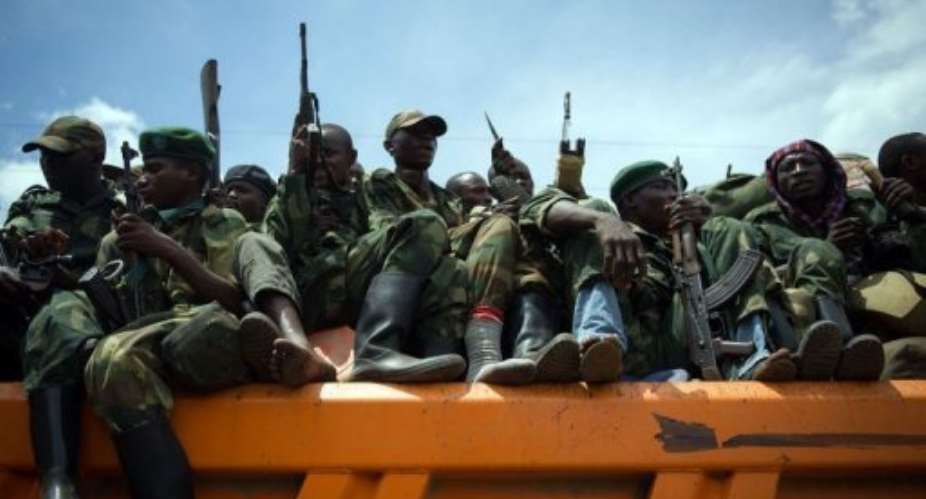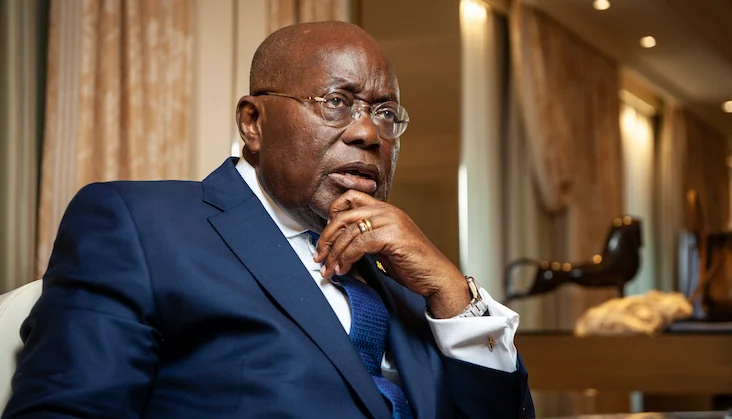GOMA, DR Congo (AFP) - Rebels in the volatile east of the Democratic Republic of Congo pulled out on Saturday from the mining hub of Goma, the city they seized less than two weeks ago sparking fears of a wider war.
Around 300 rebels, army mutineers who seized Goma in a lightning advance, drove out of the city in a convoy of looted trucks headed north, singing as they left, raising hope its signals a step back from further conflict.
The M23 rebels have pledged to withdraw 20 kilometres (12 miles) outside the city under a regionally brokered deal, but complex negotiations now will focus on their multiple and sweeping demands, including political reform.
The conflict has prompted warnings of a humanitarian catastrophe and wider conflict erupting from DR Congo's east, the cradle of back-to-back wars that shook the country and embroiled other nations in the region from 1996 to 2003.
"We are happy that they are leaving, they have made us suffer," said a 25-year-old Goma resident who gave her name only as Parfait, standing by the roadside watching the convoy rumble past.
"They have stolen so much, vehicles, ammunition, everything," she said, waving at the line of vehicles crowded with gunmen.
M23 commander Sultani Makenga, who was with the convoy pulling out, said he was obeying a deal struck with regional army chiefs under which they will cede control of Goma to UN peacekeepers.
"We will accept what they asked us," he said. "There's no problem."
Under that deal rebels will leave 100 men at Goma's airport alongside similar numbers of government troops, soldiers from neighbouring Tanzania and United Nations peacekeepers.
Ugandan Brigadier Geoffrey Muheesi, part of the regional team monitoring the withdrawal, said he was "totally satisfied" with progress of pullout.
"They are pulling out completely," he said, adding that some 300 police officers had secured key parts of the city, including government offices, the central bank and a major border post with Rwanda.
Congo's army are also preparing to move some 600 troops into Goma, a city home to around a million people, he said.
Senior police officer Julien Mwami said they were "trying to show the population that we are back to make them feel secure" and that, so far, the city was reported to be calm.
Makenga, who was hit with UN and US sanctions last month over alleged killings, rapes and abductions committed by his men, leads some 1,500 fighters, according to a Western military source.
But the rebels are reported to have beefed up their forces with heavy weaponry and ammunition abandoned by the army, which fled in disarray when the fighters seized Goma and surrounding settlements in the war-weary region.
"The government is our main supplier," laughed M23 spokesman Amani Kabasha, speaking from the departing convoy.
"This car too is one of Kabila's," he added, slapping the side of a new four-wheel drive vehicle, referring to DR Congo's President Joseph Kabila, who the rebels say should step down from office.
Jason Stearns, an independent analyst on DR Congo, speaking to Al-Jazeera in Goma, warned the rebel withdrawal "is just a tactical retreat and the war is far from over."
"The M23 needed very much to start winning the PR (public relations) battle that they had been beginning to lose, they were being seen as the aggressors... now they are seen to be acting in good faith," he said.
M23 was founded by former fighters in a Tutsi rebel group whose members were integrated into the regular army under a 2009 peace deal that they claim was never fully implemented.
Decades of conflict between multiple militia forces -- as well as meddling by regional armies -- have ravaged Congo's east, which holds vast mineral wealth including copper, diamonds, gold and key mobile phone component coltan.
UN experts have accused Rwanda and Uganda -- which played active roles in DR Congo's 1996-2003 wars -- of supporting M23, a charge both countries deny.
Britain on Friday froze $33.7 million (25.9 million euros) in aid to Rwanda following "credible and compelling reports of Rwandan involvement with M23," International Development Secretary Justine Greening said, a move condemned by Kigali.
Aid agencies are struggling to cope with the newly displaced, with some 285,000 people having fled their homes since the rebels began their uprising in April.
The instability in DR Congo's east was exacerbated by the aftermath of the 1994 genocide in Rwanda, when Hutus implicated in the killing of some 800,000 mostly Tutsi victims fled across the Congolese border after Tutsi leader Paul Kagame came to power.





 Mahama was a one-term president because he was incompetent and brought untold ha...
Mahama was a one-term president because he was incompetent and brought untold ha...
 Shortage of ‘bentua’ hits Accra Central Market
Shortage of ‘bentua’ hits Accra Central Market
 Blame IMF programme for Cedi's decline —Prof Bokpin
Blame IMF programme for Cedi's decline —Prof Bokpin
 Court denies Kasoa soldier killer bail
Court denies Kasoa soldier killer bail
 All crooked deals are cooked at Jubilee House – Franklin Cudjoe
All crooked deals are cooked at Jubilee House – Franklin Cudjoe
 Don’t be tricked by Mahama’s rebranding move – Richard Ahiagbah to Ghanaians
Don’t be tricked by Mahama’s rebranding move – Richard Ahiagbah to Ghanaians
 Petition against Kissi Agyebeng not surprising – Justice Srem Sai
Petition against Kissi Agyebeng not surprising – Justice Srem Sai
 Akufo-Addo’s handling of petitions against top officials disappointing – Justice...
Akufo-Addo’s handling of petitions against top officials disappointing – Justice...
 Osino: ‘Sleeping’ tipper truck driver runs into building
Osino: ‘Sleeping’ tipper truck driver runs into building
 Ahmed Suale's killers will be brought to justice no matter how long it takes - A...
Ahmed Suale's killers will be brought to justice no matter how long it takes - A...
